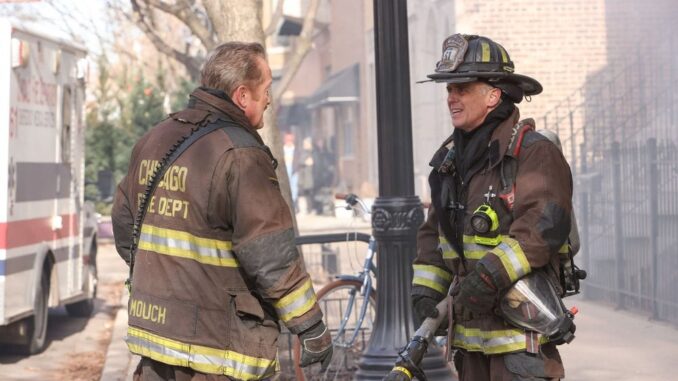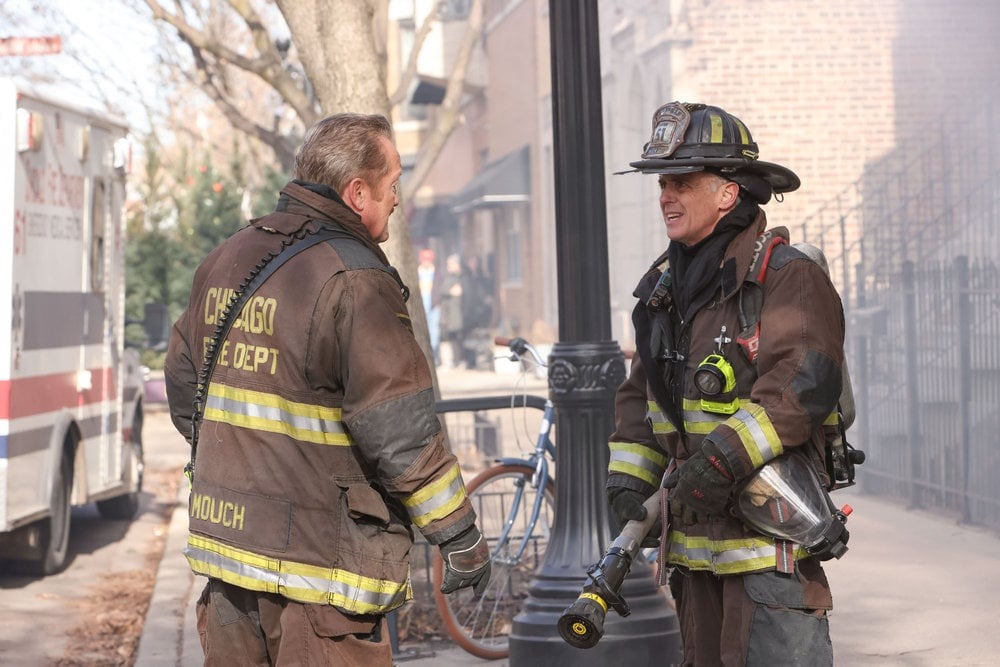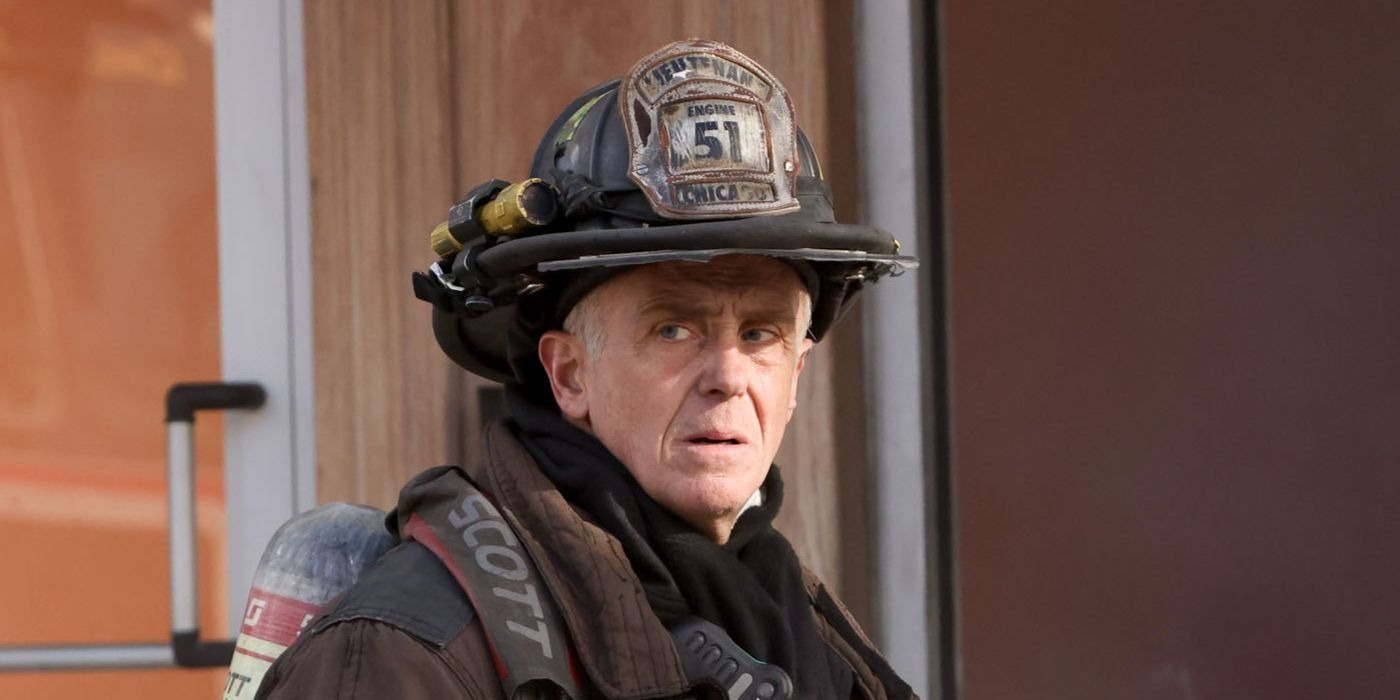
The Chicago Fire cast is fairly sizeable, and many of those actors have been with the NBC show for a long time. However, because of the size of the ensemble, there have become two groups: the star characters and the supporting players, who get their featured episodes but aren’t the ones consistently driving the plot. Chicago Fire Season 12, Episode 2, “Call Me McHolland,” shines a spotlight on the entire supporting cast — while calling attention to just how long they’ve been around.
“Call Me McHolland” takes its title from Randall “Mouch” McHolland wanting to change his image after his latest near-death experience. It also has significant storylines for Joe Cruz and Christopher Herrmann, and some solid screen time for Tony, too. The episode feels like a wonderful acknowledgement of the fact that success comes from the entire Chicago Fire group of actors — not just the best-known ones — but it also uses that to tell a cohesive story.
Chicago Fire Continues to Utilize Taylor Kinney’s Absence
Season 12, Episode 2 Builds Upon the Off-Screen Twist
“Call Me McHolland” picks up one important aspect of the Chicago Fire Season 12 premiere and then makes it better: Kelly Severide having gone MIA has an even bigger ripple effect than he or anyone else realized. Audiences are aware that this is the series having to write around the fact that Severide’s actor Taylor Kinney took a leave of absence during Season 11 — a strong example of how off-screen developments can drastically affect a TV show’s storylines. But whereas the initial focus was on how Severide’s departure affected his relationship with Stella Kidd, this episode focuses on how it changed his team.
After Severide rescues a young man who’d fallen out of a window trying to retrieve his father’s drone, Cruz takes it upon himself to likewise go out the window to get the device, and has a brief scare in which he slips. Severide angrily chastizes Cruz back at Firehouse 51 and Cruz takes that as a massive insult; he was leading Squad not so long ago, and is seemingly expected to just fall back in line. This dynamic wouldn’t exist if not for Kinney’s off-screen situation — but Chicago Fire has found a way to make that curveball a natural part of its story.

” Joe Cruz: You leave me in charge for three months, and now I can’t think for myself? ”
It would have been a cheat if Severide returned and everything just reverted back to normal. At the same time, fans have called Chicago Fire out on bad story ideas before without hesitation. The show had to come up with something that actually served its characters, and it makes all the sense in the world for Cruz to be deeply affected by both Severide’s absence and his subsequent behavior. The two are close friends and Cruz is absolutely right in thinking he’s been around Firehouse 51 long enough to become a Lieutenant himself. He, and the other supporting characters, have to move forward too or they just become props in other people’s stories.
Has Chicago Fire Finally Addressed Mouch’s Painful History?
One Subplot Calls Out His Near-Death Experiences
It’s almost a running joke that Chicago Fire keeps putting Mouch through the wringer. The character has been nearly killed off multiple times and had the retirement conversation multiple times, but nothing ever happens — so when he was imperiled at the end of Season 11, it didn’t seem that scary. “Call Me McHolland” addresses the back-and-forth with Mouch in a meaningful way. He’s not dead or retiring, but he’s begun worrying that he’s not going to be remembered for anything important.
” Mouch: My days of returning from a call and plopping down on the couch are over. ”
Christian Stolte has the requisite rant as Mouch declares that he no longer has a spot on the firehouse couch, and Mouch subsequently goes so far as to dispose of the “Mouch’s Spot” throw pillow he was gifted by Cruz years earlier. There are bits that are meant to be funny because of how worked up Mouch is on the topic, but they’re not that funny because the audience understands the serious place they come from. He really is down on himself, and it’s strange to see Mouch like that when people are so used to him being the comic character.
The subplot comes to an efficient end when future Deputy Commissioner Wallace Boden finds out about Mouch’s desire to use his last name on his turnout coat, and sits the other man down to point out how many good things he’s done while being called “Mouch.” One of Boden’s major functions is dispensing life advice to everyone else, and that scene also highlights Eamonn Walker’s importance to the show. Hearing Boden list off all that Mouch has accomplished is a reminder not just for Mouch, but for the viewers, because one of the topics that comes up here and in the storyline with Christopher Herrmann is that these characters are closing in on the end of their careers. It seems like they’ve been around the firehouse forever, but eventually they’re going to have to say goodbye.

Could Chicago Fire Exist Without Herrmann?
Season 12, Episode 2 Raises the Possibility
On the opposite end of the spectrum, Chicago Fire threatens Herrmann with medical retirement when it becomes clear that he’s suffered hearing loss as a result of the explosion in the Season 12 premiere. Another sign of growth for Daniel Kyri’s character Darren Ritter is how he keeps pushing Herrmann to get his hearing checked — if not for himself, then for the civilians or colleagues who could get hurt if he has a problem while on a call. This is another storyline to incorporate real life; NBC Insider has done a feature on how actor David Eigenberg utilizes hearing aids. And it also plays with the idea of these characters either wanting to move on or being pushed into moving on.
There’s an interesting compare-contrast between Mouch (who seems to have accepted the end is coming eventually and is looking at his legacy) and Herrmann (who’s stubbornly refusing to get help for fear of being yanked off the job). These are two totally opposite reactions — and the latter is classic Christopher Herrmann. There’s no real risk that the character is going anywhere; David Eigenberg is much better on Chicago Fire than any of his other projects, and it’s also impossible to imagine the show without Herrmann. Of all the supporting characters, Eigenberg has made Herrmann the most invaluable because of his almost larger-than-life performance. The audience can’t even imagine Herrmann being retired because he’d turn into an “old man yells at cloud” meme until his wife Cindy kicked him out of the house.
Yet “Call Me McHolland” creates moments where viewers do try and picture Firehouse 51 without Cruz, without Mouch and without Herrmann. And it’s a great reminder that this show, more than any other One Chicago series, is a team effort. It’s not just the absence of a star like Taylor Kinney that has a drastic effect on the series. Every character has their place — and all of them will have to move on in one way or another.